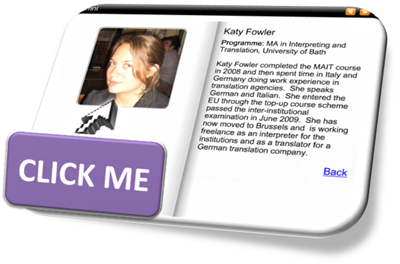Interpreting is complex, challenging and rewarding. It is a very demanding occupation but it can also be fun and exciting. Like any occupation it has pros and cons, but some of the things interpreters love about the job are the chance to hear and speak several languages, very varied work, having to think on their feet, the opportunity to travel and gain an insight into other cultures, working with different colleagues every day, and being able to help people who otherwise could not communicate.
Most interpreters enjoy a great deal of variety in their day-to-day work, and if they are self-employed they can combine interpreting with any number of other activities. Many self-employed interpreters also work as translators, proof-readers or teachers, but interpreters are creative people and some of them are also actors, artists, authors…
The reality is that there are almost as many career paths as there are interpreters. You will find interpreters helping people to communicate during GP appointments or police interviews, in war zones, in company meetings, or at summit meetings involving heads of state and government.
Employers
There are many bodies that employ interpreters, from international organisations to local councils. You can find out more information about some of these through our links page, and see resources and videos about what it’s really like working for them in Where do Interpreters Work.
Careers events
The NNI runs careers days across the UK about getting into languages and interpreting. Have a look at the NNI Events to see what we do, or see Careers with Languages under Careers.
Alumni
If you want to know more about what people go on to do after an interpreting course, and how they get into the industry, don’t just take it from us! As well as the events and resources mentioned above, we’ve asked some interpreting alumni to tell us a bit more about what they did after their courses.
Click for the University of Leeds Centre for Translation Studies
Click for the University of Salford School of Languages
Employability
Interpreting graduates are currently very employable. The language services market is booming, which is good news for those looking to go straight into the sector. Besides this, a course in interpreting is also useful for those who go on to seek work in other areas; the wide range of transferable skills such a course gives you is exactly what employers are looking for. Some of these skills are listed below:
- Overcoming nerves
- Addressing an audience confidently and becoming a better communicator
- Listening closely to a speaker and hearing the real message
- Speaking spontaneously and coherently on a variety of topical issues
- Excellent general knowledge and understanding of current affairs
- Sound analytical skills
- Good mastery of mother tongue
- Excellent comprehension of foreign languages
- Research skills
- Ability to work to a deadline
- Sense of initiative
NNI at Brussels
Here is an example of interpreters working in Brussels.


